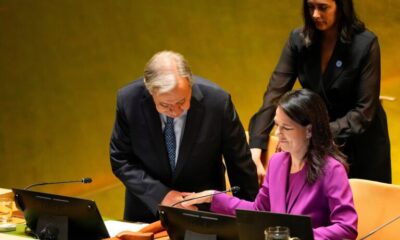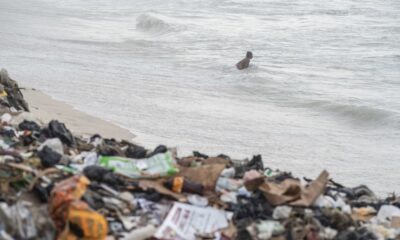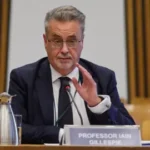Environment
Water firm bans tankers from transporting water for billionaire’s lake

Read more on post.
Jonah FisherEnvironment correspondent and
Tom InghamClimate and Science Producer
Southern Water has warned tanker companies to stop delivering its water to the Wiltshire estate of an American billionaire.
Some of it was recently used, entirely legally, to help fill a lake, despite a hosepipe ban being in place locally for domestic users.
Multiple water tankers have been filmed both day and night by local residents filling up from standpipes in part of neighbouring Hampshire where a drought order is in place.
The BBC has been told that those tankers went to Conholt Park, a 2,500-acre estate owned by Stephen Schwarzman – who is one of the world’s richest men and a financial backer of US President Donald Trump.
A spokesperson for Mr Schwarzman confirmed that a small proportion of the water transported had very recently been used to help fill a new lake but said the water has been “sourced through licenced providers responsible for the lawful and proper extraction and delivery”. They said that following the Southern Water request the supply of water to the lake had been adjusted.
Despite the ongoing drought, the tankers are legally allowed to take the water in Hampshire under licence because construction work is not domestic and therefore not covered by current drought restrictions.
However, Tim McMahon, Southern Water’s managing director, said he was “appalled by this use of water” and that the company had imposed on immediate ban on tankers extracting from the standpipes.
Southern Water said it did not know exactly how much water had been taken but that there had been a spike in the last week with “significant” amounts taken but with other users also making use of the standpipes it was impossible to say who had taken more.
 Jonah Fisher/BBC
Jonah Fisher/BBCThe water firm, which serves more than two million customers, said it was first alerted by residents in Andover who had spotted the tankers coming and going from the standpipes.
Among them was Lawrence Leask, an air conditioning inspector who told the BBC that he has been waking up at 03:00 BST to follow the tankers from the standpipes in Andover to the estate eight miles away, just over the border in Wiltshire, which is not subject to a drought order at present.
“We think there have been over 30 tankers a day, seven days a week,” he said.
“That’s a lot of water. I worked out that 30 tankers means a million litres a day, something like that.”
He said it had been going on for the past few months, prompting him to co-ordinate a network of neighbours who took it in turns to film and follow the tankers.
One of those, Trevor Marshall, said: “We think they might be using the water to fill the lake. He makes notes of the tankers passing his kitchen window and sends them to Lawrence.
“At the same time we’re on a hosepipe ban – it’s incredibly outrageous.”
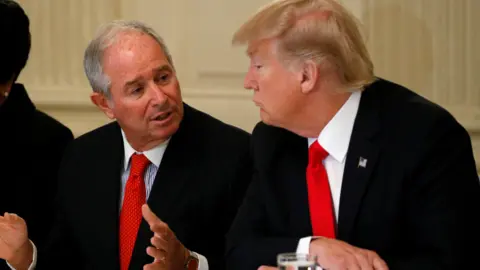 Reuters/Kevin Lamarque
Reuters/Kevin LamarqueMr Schwarzman is one of the world’s richest men, with an estimated worth of more than £30bn, having founded Blackstone, one of the biggest investment funds in the world.
He has been renovating the 2,500 acre, 17th century shooting estate since he bought it in 2022 for an estimated £80m.
That involves an extensive redevelopment and constructing a new lake.
A statement from Blackstone said: “The suggestion that the new owners of Conholt Park violated water regulations is false and misleading.
“They have taken extraordinary care to ensure the restoration of the property complies with all local laws and regulations. Most recently, as construction winds down (expected to be completed very soon) a proportion of transported water has been used in connection with irrigation and the lake.
“The water has been sourced through licenced providers responsible for the lawful and proper extraction and delivery. Water has been sourced from multiple locations, largely outside the region. Any suggestion that the owners violated local water regulations would be false and misleading.”
Southern Water said it would be “having robust conversations with those using this water and the companies working on their behalf”.
Managing director Tim McMahon said: “While this disappointing occurrence is highly unusual and rare, I would like to reassure customers that I am leading a thorough review into how this happened, and how we can tighten up both our internal monitoring processes and any legal loopholes so that this cannot happen again.”
Environment
China, world’s largest carbon polluting nation, announces new climate goal to cut emissions
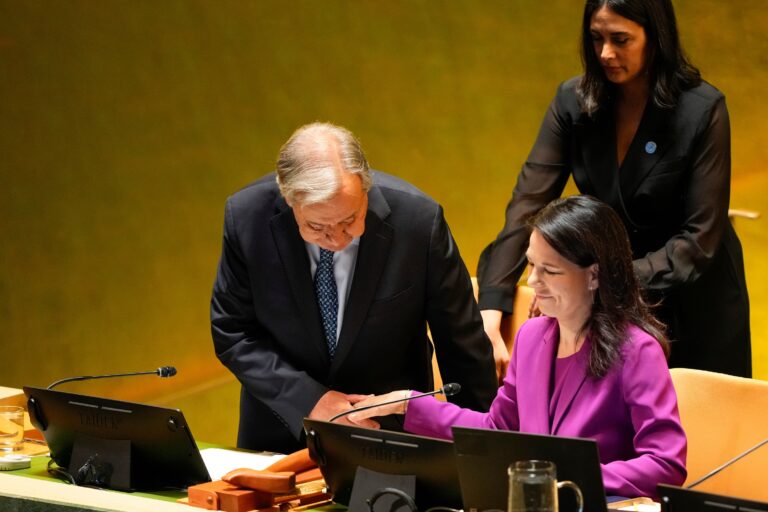
This post was originally published on this site.
Environment
Indigenous women in Peru use technology to protect Amazon forests

This post was originally published on this site.
Environment
China makes landmark pledge to cut its climate emissions
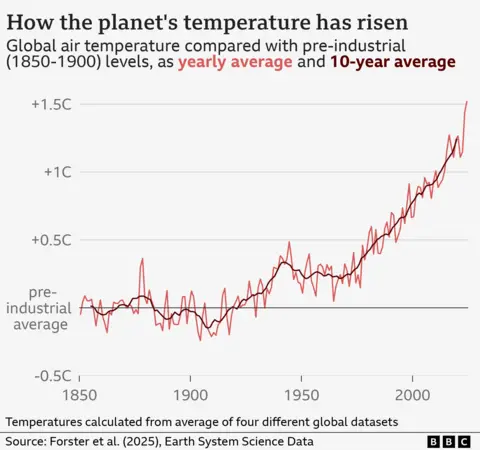
Read more on post.
Mark Poynting and Matt McGrathBBC News Climate and Science
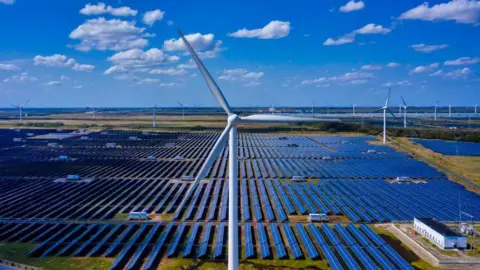 European Photopress Agency
European Photopress AgencyChina, the world’s biggest source of planet-warming gases, has for the first time committed to an absolute target to cut its emissions.
In a video statement to the UN in New York, President Xi Jinping said that China would reduce its greenhouse gas emissions across the economy by 7-10% by 2035, while “striving to do better”.
The announcement comes at a time the US is rolling back on its commitments, with President Donald Trump on Tuesday calling climate change a “con job”.
But some critics said China’s plan did not go as far as hoped to keep global climate goals in reach.
“Even for those with tempered expectations, what’s presented today still falls short,” said Yao Zhe, global policy adviser at Greenpeace East Asia.
While the year’s big gathering of global leaders will be at COP30 in Brazil in November, this week’s UN meeting in New York has extra relevance because countries are running out of time to submit their new climate plans.
These pledges – submitted every five years – are a key part of the Paris climate agreement, the landmark deal in which nearly 200 countries agreed steps to try to limit global warming.
The original deadline for these new commitments – covering emissions cuts by 2035 – was back in February, but countries are now scrambling to present them by the end of September.
Speaking before the meeting UN Secretary-General António Guterres said the pledges were critical to keep the long-term rise in global temperatures under 1.5C, as agreed in Paris.
“We absolutely need countries to come […] with climate action plans that are fully aligned with 1.5 degrees, that cover the whole of their economies and the whole of their greenhouse gas emissions,” he said.
“It is essential that we have a drastic reduction of emissions in the next few years if you want to keep the 1.5 degrees Celsius limit alive,” he added.
As the world’s biggest emitter, China’s plans are key to keeping this goal in sight.
Back in 2021, President Xi announced that China would aim to peak its emissions this decade and reach “carbon neutrality” by 2060.
Today’s pledge marks the first time that China has set actual emissions reductions targets on that path.
“These targets represent China’s best efforts based on the requirements of the Paris agreement,” President Xi said.
It also covers all greenhouse gases, not just carbon dioxide, and will be measured “from peak levels” of emissions – the timing of which President Xi did not specify.
He added China would:
- expand wind and solar power capacity to more than six times 2020 levels
- increase forest stocks to more than 24bn cubic metres
- make “new energy vehicles” the mainstream in new vehicle sales
Off track for 1.5C
Such is the scale of China’s emissions that any reduction would be significant in climate terms.
China was responsible for more than a quarter of planet-warming emissions in 2023, at almost 14bn tonnes of carbon dioxide-equivalent.
A 10% reduction in China’s emissions would equate to 1.4bn tonnes a year, which is nearly four times the UK’s total annual emissions.
But China’s new target does fall short of what would be needed to meet international climate goals.
“Anything less than 30% is definitely not aligned with 1.5 degrees,” said Lauri Myllyvirta, lead analyst at the Centre for Research on Energy and Clean Air.
Most scenarios to limit warming to 1.5C – or even well below 2C – would require China to make much greater cuts than that by 2035, he added.
In many cases, that would mean more than a 50% reduction.
It is further evidence of the gap between what needs to be done to meet climate targets and what countries are planning.
Earlier this week, a report by the Stockholm Environment Institute warned that governments around the world are collectively planning to produce more than double the amount of fossil fuels in 2030 than would be in line with keeping to 1.5C.
Ramp-up of renewables
What gives some observers hope is that China has a track record of exceeding many of its international climate commitments.
It had, for example, pledged to reach a capacity of 1,200 gigawatts for wind and solar power by 2030. It smashed through that goal in 2024 – six years early.
“The targets should be seen as a floor rather than a ceiling,” said Li Shuo, director of China Climate Hub at the Asia Society Policy Institute.
“China’s rapid clean tech growth […] could propel the country much further over the coming decade,” he added.
“China’s 2035 target simply isn’t representative of the pace of the energy transition in the country,” agreed Bernice Lee, distinguished fellow and senior adviser at Chatham House.
“There’s a case to be made that Beijing missed a trick in landing a more ambitious goal as it would have won broad global praise – a stark contrast to the US,” she added.
While China ramps up its renewables, it continues to rely heavily on coal, the dirtiest fossil fuel.
Last year saw China’s electricity generation from coal hit a new record – although initial data suggests it has fallen in the first half of 2025 amid a surge in solar electricity.
“There is also mounting evidence that the country’s emissions are plateauing, with this year’s levels expected to be lower than in 2024,” said Li Shuo.
Today’s new target signals “the beginning of decarbonisation after decades of rapid emissions growth”, he added.

-
Culture2 days ago
Taylor Swift’s new cinema outing generates more than €12million in just 24 hours
-
Politics2 days ago
European Parliament snubs Orbán with vote to shield Italian MEP from Hungarian arrest
-
Culture1 day ago
Milan Fashion Week 2025: Unmissable shows and Giorgio Armani in mind
-
Business14 hours ago
Households to be offered energy bill changes, but unlikely to lead to savings
-
Opinion2 days ago
AI Is Pointless If It Doesn’t Boost Productivity
-
Culture2 days ago
Marvel stars Mark Ruffalo and Pedro Pascal stand up for Jimmy Kimmel as Disney boycott intensifies
-
Culture1 day ago
Traitors Ireland finale: A tense and thrilling conclusion to a spectacular first season
-
Travel & Lifestyle1 day ago
At the Marrakech International Storytelling Festival, an Ancient Tradition Finds New Life



